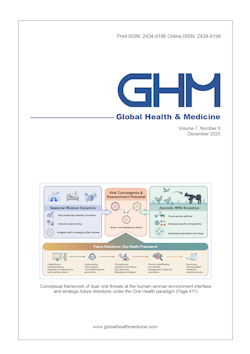Global Health & Medicine 2024;6(5):339-344.
The association between HIV infection and perimenopausal syndrome: A matched cross-sectional study of women living with HIV/ AIDS and their uninfected counterparts in rural areas of Anhui, China
Xiao YK, Ji GP, Xu ZH, Chen R, Luo ST, Li QY, Wang AX, Liu AW
The study compared the level of perimenopausal syndrome (PS) among women age 40 or older living with HIV/AIDS (WLWH) and their HIV-negative counterparts in rural areas of Anhui, China and it analyzed the association between HIV infection and PS. From March 2018 to February 2019, WLWH ≥ the age of 40 and their aged-matched HIV-negative female neighbors in 8 townships in the cities of Fuyang and Bozhou in Anhui Province, China were selected by cluster random sampling to respond to a questionnaire survey. Multivariable logistic regression analysis was performed. Responses from a total of 464 participants were analyzed, including 220 HIV-positive women and 244 HIV-negative female neighbors. The average score for PS was 18.02 and the prevalence of PS was 85.0% in the HIV-positive group, both of which were higher than those in the control group (p < 0.05). The most common PS symptoms among WLWH were irritability (83.2%), followed by fatigue (79.5%) and arthralgia myalgia (68.2%). The risk of developing moderate to severe PS in HIV-uninfected women was 0.605 times that in WLWH. Other significant risk factors included being older, a history of chronic diseases, poor sleep quality, and poor appetite. In the future, more attention should be paid to the prevention of PS in WLWH while actively providing antiretroviral therapy and follow-up.
DOI: 10.35772/ghm.2024.01050







